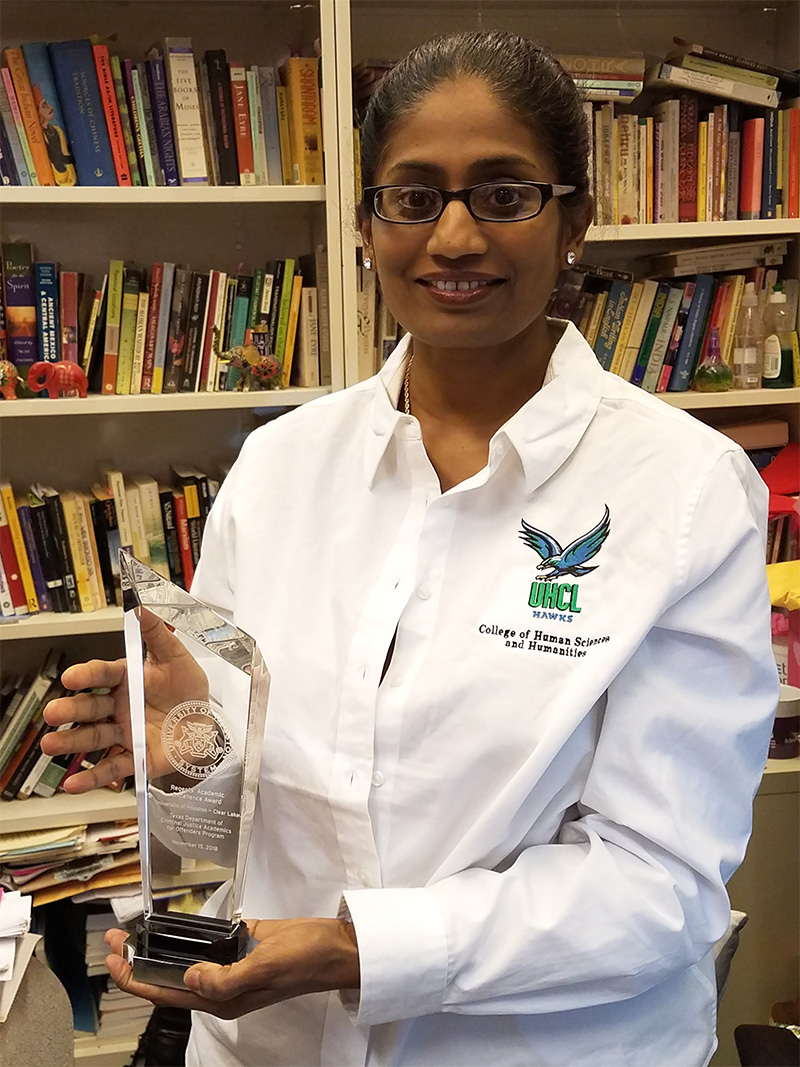
HSH’s Academics for Offenders program earns Regent’s Academic Excellence Award

University of Houston-Clear Lake Academics for Offenders program, housed in the College of HSH, received the Regent’s Academic Excellence Award for providing undergraduate and graduate programs to local Texas Department of Criminal Justice correctional facilities alongside Alvin Community College.
The Regent’s Academic Excellence Award recognizes University of Houston System institutions’ programs and initiatives that exemplify excellence in teaching, research and/or public service. The program has awarded more than 600 total degrees in Humanities, Behavioral Sciences-General, Liberal Arts and Literature since the installation of the program in 1974.
A combination of adjunct and full-time faculty teaches at the W.F. Ramsey Unit, and will soon teach at H.H. Coffield, Beto and Hughes using televised and face-to-face classes.
William Powers, director of the TDCJ program Academics for Offenders, leads the efforts in connecting UHCL professors with the opportunity to teach those incarcerated.
“We only use voluntary faculty,” Powers said. “There is no one that is assigned to go out there, and that is a strength of the program. It is individuals who have a commitment to do this.”
This commitment has brought positive feedback from both the students and professors within the program.
“A [TDCJ] instructor said in his class that one of his students came up to him, and they were talking about introspection and John Stuart Mill, and this particular individual said, ‘How come nobody was around to teach us that in high school,’” Powers said. “In many cases, they are exposed for the first time these kinds of ideas.”
Many of the professors involved in this program were excited along with Powers for this long-awaited recognition.
“To be identified and recognized as the single outstanding program in the system, that is [a] pretty good deal,” Powers said. “This is the first time in 47 years.”
Powers also noted the benefits of the program, especially those moving forward with the recent recognition.
“There have been periodic studies that show how beneficial education was to reducing the rate people re-enter prison,” Powers said. “We’ve added Master’s programs, and there is one other Master’s program for incarcerated students but it is by correspondence, so we’re the only face-to-face Master’s program in corrections in the United States.”
In addition to the new Master’s programs, the program has also been granted the Second Chance Pell Initiative, which provides undergraduate incarcerated students with funds to complete their undergraduate studies. The UHCL-Trinity Valley Community College expansion will allow professors at UHCL within the HSH programs to televise their class instructions to correctional units such as Coffield, Beto and Hughes alongside Trinity Valley Community College, and soon provide degree programs to female units.
“In talking to faculty over the last 20 years, the way they describe it is that the best and most capable TDCJ student compares favorably to the best and most capable on-campus students,” Powers said. ”The curriculum that we offer out there is exactly the same curriculum in the four degrees as is offered on campus. So we don’t dilute it or water it down, we don’t treat them differently because, in increasing numbers, they come on campus and go to school. So we owe it to them to be prepared to succeed on campus too in other programs.”
Shreerekha Subramanian, associate professor of humanities and department chair of liberal arts, recalls her experience teaching at the Ramsey unit.
“There are so many misconceptions about students who are incarcerated, but the ones who make it to the classroom in the prison is a very small population,” Subramanian said. “So, when they are in your classroom they are eager to learn; they are eager to open the book; they don’t want handouts; they don’t want piecemeal stuff. If I give them an article they are like, ‘I want to read the rest of it.’”
Subramanian said experience at Ramsey unity has been an eye-opening one to what it means to educate.
“I believe the mission of the program is to be inclusive. In the way that our university started to cater to non-traditional students in 1974,” Subramanian said. “Be radically inclusive, not to think about just one group of people, but to really include everyone in the fold of learning because learning benefits everybody. It empowers everybody, and I think the fact that we have been able to do it uninterrupted all these years…all of that has meant that we have stayed true to our mission.”
This commitment to include all in the transformative power of education has helped the Academics for Offenders program gain recognition from UHCL President Ira K. Blake.
“I am so pleased that your long-term commitment to changing lives and society through the TDCJ College Program has been recognized,” Blake stated in a university press release.
Subramanian said she is excited for the Academics for Offenders program to receive recognition and acknowledgment from university officials such as UHCL President Ira Blake and University of Houston Chancellor Renu Khator.
“It gives such a positive recognition, and I think most importantly it is going to elate our students and make them feel recognized and affirmed in what they do,” Subramanian said. “It’s going to help our program grow and reach more students.”
An in-depth look into the program via video was provided by professor Micheal Brims, assistant professor of communication and digital media studies, who took time to capture footage of the classroom behind bars.
